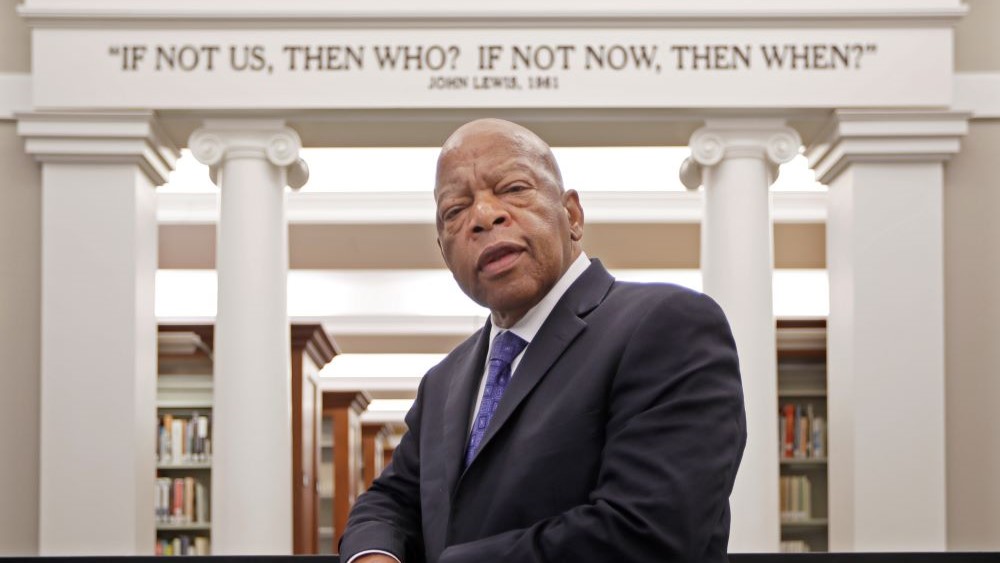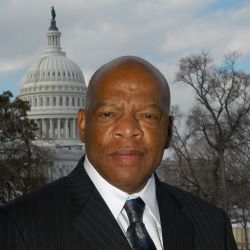
The Fulbright-John Lewis Fellowship provides a unique opportunity for Fulbright U.S. Student Program participants to join a cohort of their peers and participate in virtual activities advancing the goals of the Fellowship during their Fulbright exchanges such as a dedicated lecture series, leadership training, development opportunities, and an in-person capstone seminar.
Established through bi-partisan legislation in both the U.S. House of Representatives and the U.S. Senate, the U.S. Department of State’s Bureau of Educational and Cultural Affairs created the Fulbright-John Lewis Civil Rights Fellowship in 2024 to honor the legacy of the civil rights leader and former member of the U.S. House of Representatives John Lewis. The fellowship is designed to inspire future generations to carry on his vision of non-violent civil rights work, and promote the understanding of the history and tenets of nonviolent civil rights movements around the globe. The 2024 Fulbright-John Lewis Civil Rights Fellows represent the breadth of the United States through their backgrounds and experiences, and as researchers in a wide range of academic disciplines. They will carry out research projects in 23 countries in all world areas.
The Fellows come from all regions of the United States. Their research projects explore concepts of citizenship, human rights, democratic movements, and peace and conflicts studies in nations and regions across the world.
By bringing together this community of researchers throughout their Fulbright experience, the Fulbright-John Lewis Civil Rights Fellowship will help these U.S. participants share knowledge with their peers, conduct meaningful research, and promote the Fulbright Program’s goal of cross-cultural exchange and mutual understanding.

2024-2025 Fulbright-John Lewis Civil Rights Fellowship Recipients

Mele’ana Kehaulani ‘Akolo
Kingdom of Tonga

Chamise Anderson
Barbados

Céline Apollon
Republic of Congo

Jessica Ashman
Ecuador

Vera Carothers
Argentina

Jasmine Carty
Luxembourg

Sean Coffman Atchison
Brazil

Nilufahr Cooper
Germany

Solomon Ra’phael Davis
Nigeria

Victoria Dey
France

Valencia Epps
South Korea

Temitope Famodu
Hungary

Maria Caterina Gargano
Mexico

Christopher Handwerk
Kosovo

Nathan Johnson
United Kingdom

Mohnish Judge
India

Liam Martin
Canada

Rachel Margolis
Argentina

Francesca Nyakora
Brazil

Tesfamichael Negussie
Ethiopia

Travis Richardson
New Zealand

Natalie Schirmacher
Finland

Munirat Suleiman
Germany

Connie Ticho
South Africa

Anthony Wagner V
Brazil

Desiree Winns
Lithuania

Sophie Mariko Wheeler
Japan
About Representative John Lewis (February 21, 1940 – July 17, 2020)

The life and career of John Lewis models the unwavering commitment to peaceful protests against injustice toward Black Americans, and the legislative victories of the U.S. civil rights movement. Born in 1940 in Alabama, Lewis was one of the student founders in 1960 of the Student Non-Violent Coordinating Committee (SNCC) and its chairman from 1963 to 1966. Lewis helped to organize many of the touchstone moments in the civil rights movement of the 1960s, including the Freedom Rides, the 1963 March on Washington, and the march from Selma to Montgomery, Alabama.
In 1963, Lewis addressed the crowd at the March on Washington before Martin Luther King, Jr.’s “I Have a Dream Speech” and met with President Kennedy. He faced threats, arrest, and endured violence, most famously during the “Bloody Sunday” march in 1965 on the Edmund Pettus Bridge, which spurred the passage of the Voting Rights Act in the same year. During the late 1960s through the 1980s, Lewis devoted his time to various community organizing and voter registration efforts.
In 1987, Lewis was elected to represent Georgia’s 5th District in the House of Representatives, where he served until 2020 as the “conscience of the Congress,” passing legislation such as the 2003 bill establishing the National Museum of African American History and Culture, which stands on the National Mall in Washington, D.C.
Adapted from The National Archives and Smithsonian Magazine
Information about the Fulbright-John Lewis Fellowship is available at us.fulbrightonline.org/applicants/types-of-awards/fulbright-john-lewis-civil-rights-fellowship.